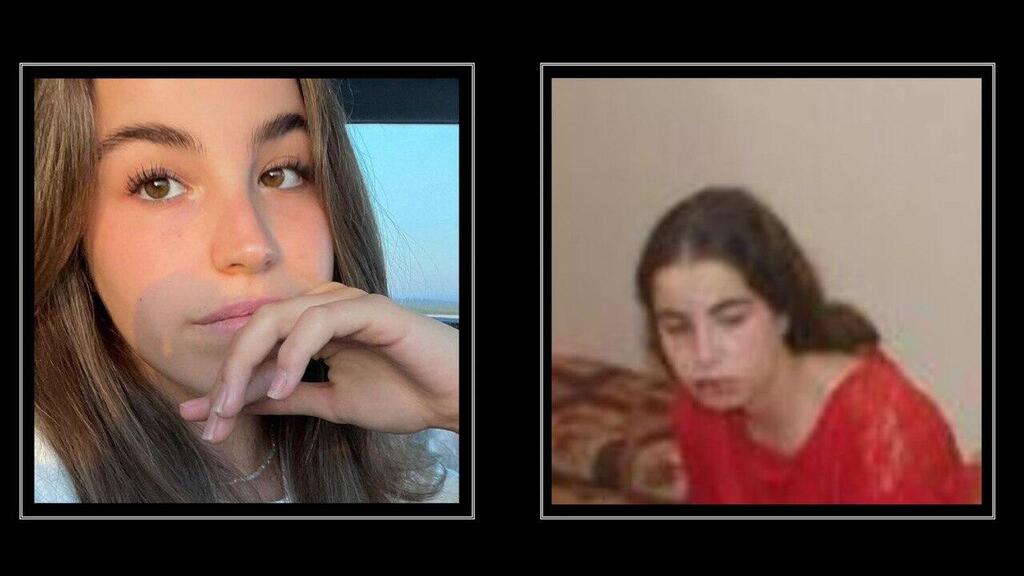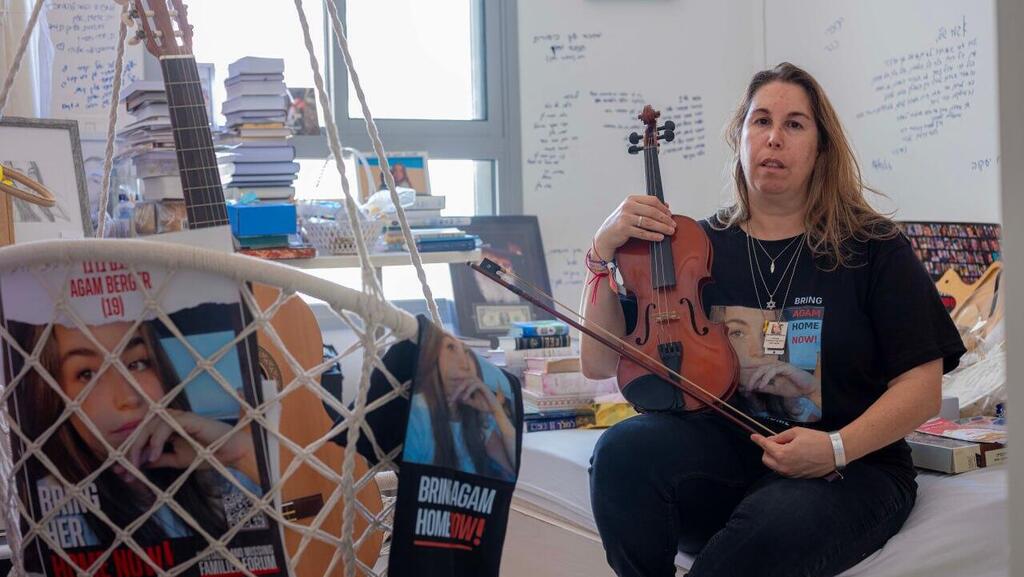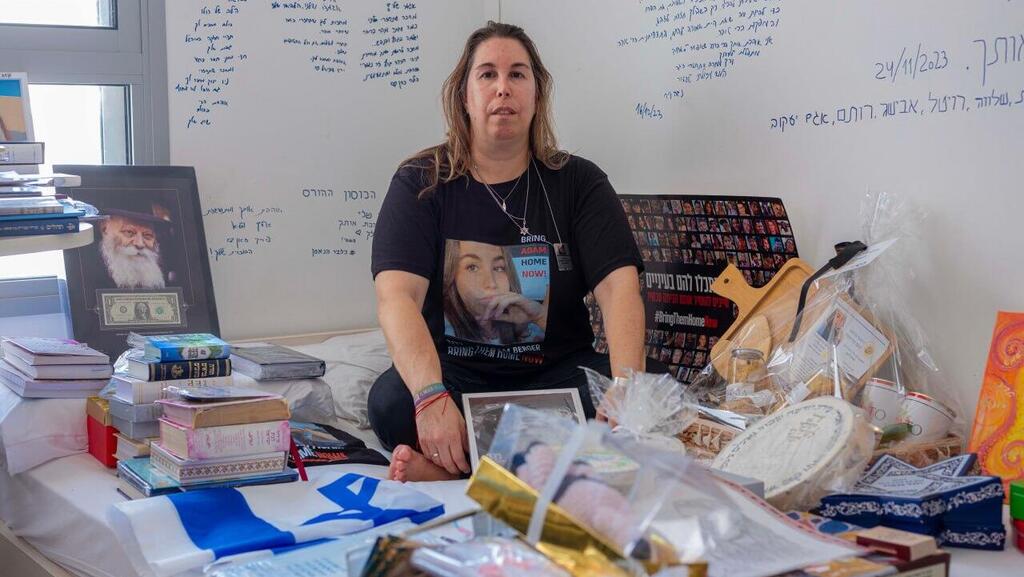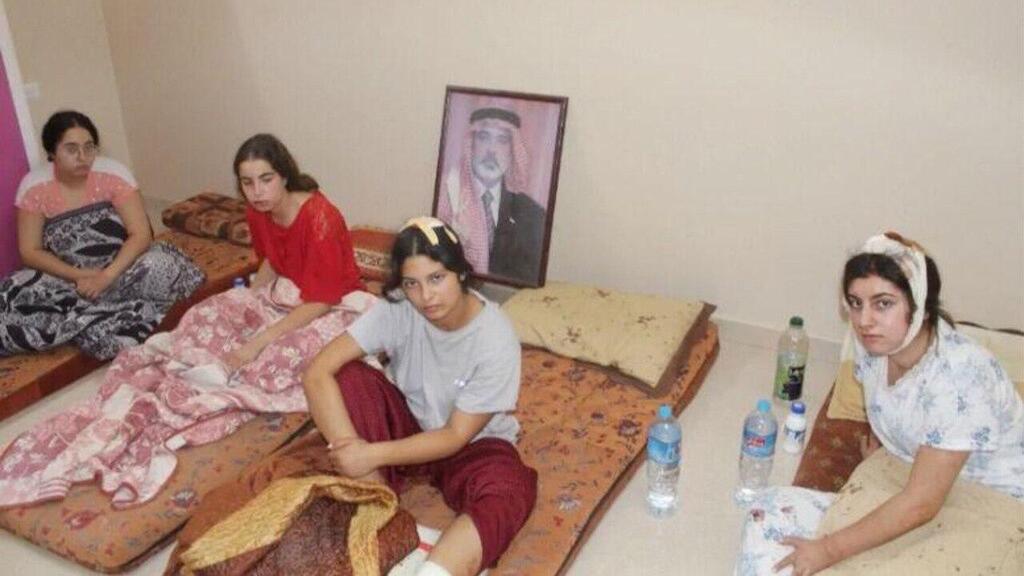Getting your Trinity Audio player ready...
"Agam is a child full of meaning. Sometimes it takes a person a lifetime to come to this realization, but she already felt as if she had a mission and purpose in the world from a young age," says Meirav, mother of 19-year-old IDF outlook Agam Berger who was kidnapped to Gaza from a military base near Kibbutz Nahal Oz.
A week before the end of her military training course, Agam's placement was changed to the southern base. On October 7, she managed to call her family from a friend's phone and said, "They're shooting at us, there are terrorists – but I'm not afraid."
Agam has a twin sister, Li-Yam, another 18-year-old sister, and a younger brother who celebrated his Bar Mitzvah while she was in Hamas captivity. She has been playing the violin since a young age and studied in a music program. In high school, she created a board with newspaper clippings featuring words and concepts that characterize her.
Her mother shares: "She wrote 'The story of my life is faith,' she’s a very rooted child. 'Family is a gift' – the most significant people for her are her family. 'Thank you,' she’s a child of gratitude and gets excited about simple things, and the word 'freedom' appears prominently. All of this from a 16-year-old girl."
Agam Berger
After finishing her schooling, Agam chose to spend a year in a pre-military program during which she received her IDF assignment as a lookout. "She wanted to be a basic training instructor and tried to change her assignment without success. She decided that if this was her role, she would do it to the best of her ability and aim for command and officer positions," Meirav explains.
Agam was assigned to the Gaza sector and the Kerem Shalom post. A week before her training course ended and she was dispersed to their new bases, she received a new assignment to Nahal Oz. She was shaken. Despite wanting to be assigned to the southern sector and getting it, she did not understand why her post was changed at the last minute.
"I remember the conversation with her, she told me, 'Mom, is this for the best? How come?' I told her there were things beyond our control. Later, they asked me to send her a recording congratulating her for the end of her course.
I sent her a recording and blessed her journey, wishing her to excel in everything she does and to be surrounded by good people, and I ended the recording with the phrase, 'Wherever you are, that's where your destiny is.' Two days later, while that sentence was probably still echoing in her mind, she was kidnapped."
A week before the end of her course, Agam and her mother were corresponding on WhatsApp, and Agam mentioned that she suspected they wouldn't be sent to border-adjacent bases immediately after the course due to the unrest in the area.
"During basic training and her course, Agam was selected for a track intended for command and officer positions," Meirav shares. Accordingly, she prepared a lesson for her friends to mark the end of the course and handed out letters.
At the top of the page, she quoted Rabbi Nachman of Breslov: "Who will reveal to a person that all of the things stopping him from progressing his life are actually just his imagination?" She then added in her own words.
"Our role has immense importance that comes with many challenges. You never know what will happen during your shift. Therefore, whatever you do, do it in the best way you can. I hope the role contributes to you as you contribute to it, and that you feel significant doing it."
Agam finished the course on Wednesday, and on Thursday, her father Shlomi and mother Meirav drove her to the Orim base with other soldiers. "She really didn't want to be on weekend duty, she was sad, and I tried to cheer her up. After she arrived at the base, she spoke with some friends in the room and called me and said – it's okay, Mom, I'll be the first in the rotation and get it over with quickly."
The parents hadn't left the area, and Meirav remembered that the socks she had washed for Agam hadn't dried yet. "I told her to take them wet and hang them, and then I noticed there was a shopping center in the Ofakim area. I bought her some socks, and she asked me to leave them at the guard post because they were still in the process of checking into the base, so I didn't get a chance to hug her again."
On Saturday morning, the Berger family in Holon was sleeping as usual. Meirav has been observing Shabbat for the past eight months, in memory of her mother who passed away in January.
"I was without my phone, but the rest of the family went as usual," she recounts. "At 06:30 a.m., the sirens began, we went into the safe room, and my phone rang, but I wasn't with it. Then her sister bar’s phone rang. Agam was also surprised by the sirens and ran from her bed to the safe room. She forgot her phone and called us from her friend's phone, Shirat Yam Amar, who was later murdered.
"She didn't say much during the call, only that there were sirens sounding and that she was in a safe place. I wasn't worried, I understood she was on a military base, which is supposed to be the safest place there is. In my mind, she was in an underground command center in some bunker, that's what I imagined.
“After twenty minutes, another call from Agam came in, where she said: 'Mom, they’re shooting at us, there are terrorists, everyone is crying, but I'm not afraid,' and then the call was disconnected. That was the last time we had any contact with her."
What happened next was revealed to the public by the lookouts’ families via videos that reached the IDF filmed by Hamas terrorists. "I didn't watch any of the videos, not of the kidnapping, not from the shelter, nor any others that they showed us. But I did see the picture of her injury. It looks like she understood what was happening quite quickly, she said she wasn't afraid."
Agam’s condition in captivity
On November 26, Agam's father Shlomi Berger’s birthday, another Agam, Agam Goldstein-Almog who was kidnapped from Kibbutz Nahal Oz, returned to Israel after a hostage deal with Hamas.
Meirav shared: "Before she boarded the helicopter to Israel, she insisted on taking a phone and calling us. She had our number. They underwent significant psychological warfare there, they believed there was nowhere to return. My Agam was with Agam Goldstein for about 10 days, they were moved from place to place until they were together in the tunnels.
"When they realized Agam was being released, my Agam cleverly gave her our phone numbers. In a call from Israel, Agam Goldstein told us she was hungry and wanted to eat all day; that she prayed a lot, blessed the food, and didn't light fire on Shabbat,” she added.
“We asked her if she was in good spirits, and she said yes. She had many low points but remained calm and kept everyone calm." Since then, the family received one sign of life from her in the form of military intelligence information back in February. Five months have passed since then.
Moments of crisis
"I try to think that she really is protected there and that she has private divine protection because it's impossible to breathe otherwise, to survive and live through this," Meirav shares. "There are breakdowns, how long can one hold up this mask? I break down and cry, but I live her image. My entire existence is her, every breath and every action of mine revolves around the struggle to bring her home.
“I can say that the hardest moments are during Friday night dinners. It’s a time when we’re always all together and around the Kiddush and Shabbat candles. It’s no coincidence these are also the testimonies we received about Agam in captivity, that she would break down on Fridays, these are significant moments for our family."
Moments of hope
Meirav also imagines the moment Agam returns, though it’s not always easy. "It will be like being born again, there will be tears of joy and a hug that we can't let go of, a kind of release. And gratitude to the Creator, in the end, my belief is that He will bring her back, we just need to wait for that moment."







